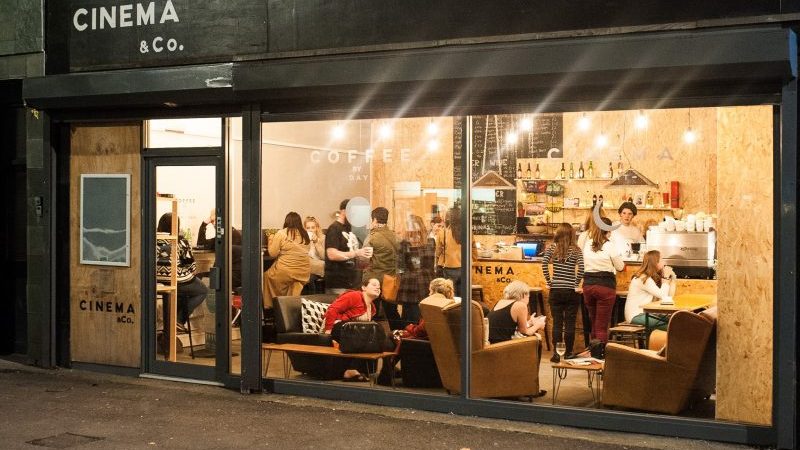
Cinema & KO! My Final Placement by Sam
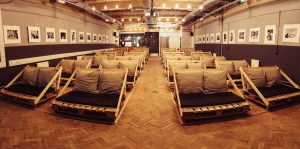
The last month of my placement at Cinema & Co. was unfortunately cut short due to the current climate (hope everyone’s keeping safe!) but the good news is that, following on from my previous blog (which you can read here) myself and the team managed to launch Cinema & KO. to great success. In this final blog, I’ll be discussing how Johan and I made final preparations for the event, the successes and failures of the event itself, and also reflecting on my time as a whole.
The first day back after uploading the last blog consisted of improving on skills I’d gained previously. To begin, I helped once again edit an updated trailer reel, removing old events and trailers that had already been, and replacing them with new ones. This editing proved to be a lot quicker than the last (a sign of my skills improving I’m sure) and I still felt as though I’d managed to further improve my editing skills even more. This would prove incredibly useful for university assessments like video essays, but also for personal projects like making short films and more. After this, Johan and I moved onto making sure everything was in place for the main event: Cinema & KO.
The event itself was to be split into two main parts. Both taking place on a Saturday, the first half would be open to everyone. We planned on having Nintendo Switches set up in the main cinema room, and a backup in the entrance area for when the main tournaments weren’t on. This event would run until 5, at which point we’d close up, and begin swapping out the switches for an Xbox one, for our main tournament event (that was for over 18’s only, since the game Mortal Kombat 11 was rated 18). This tournament would run until 9pm, with the bar being open for the entire event.
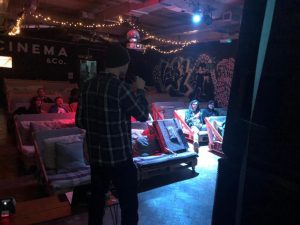 In order to make sure we were fully prepared; we did several things. First of all, I made contact with Game once again, ensuring we had consoles and games ready for both halves of the event. Having this contact before starting the event proved crucial, as without Game, the first half would more than likely have not existed, as Game provided both the switches and games we used for the mini tournaments (The Xbox and copy of Mortal Kombat 11 belonged to the cinema).
In order to make sure we were fully prepared; we did several things. First of all, I made contact with Game once again, ensuring we had consoles and games ready for both halves of the event. Having this contact before starting the event proved crucial, as without Game, the first half would more than likely have not existed, as Game provided both the switches and games we used for the mini tournaments (The Xbox and copy of Mortal Kombat 11 belonged to the cinema).
The second half of the preparation revolved around creating a tournament bracket for the second and main half of the event, as professionalism was key. Though our main goal was to ensure everyone had fun and enjoyed themselves, it was also crucial to ensure the tournament itself was fair and done professionally, as this would ensure satisfaction from everyone, and (hopefully) ensure they would return to the next event, and bring more people too.
We experimented with a few different ideas, from creating the bracket in different formats such as Microsoft excel, to using an automatic generator. Though I developed my technical skills here, by beginning to create a working bracket on my laptop, eventually we opted for an online one that would generate the brackets randomly and uniquely. This was to ensure the bracket itself looked professional and that there would be no problems in functionality, that could cause delays in the event.
After this, we decided to review the overall plan, before agreeing to meet next on the Saturday of the event. This would be the accumulation of all our hard work over the past few weeks, and so we were both excited and nervous to see how the event would proceed.
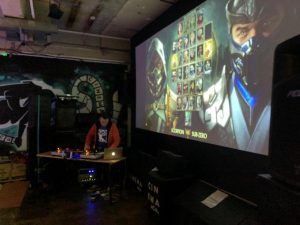 The Saturday of the event arrived, and would also mark the end of my time on placement at Cinema & Co. The first half of the event, where we opened it up for everyone to play Mario Kart and Super Smash Bros. proved to be very successful. Though not our target audience (and not our main event) it was certainly exciting to see how popular it was, with many families and some adults coming in to have a look and get involved. I developed a few skills during this first half, mainly to do with communication and management. As a sort of co-host, I was helping to ensure everything was running smoothly. This meant juggling tasks such as monitoring one of the two Nintendo Switches we had at the time and answering any questions in regard to how to play the games, how long we were running it for, and if the event would be held again.
The Saturday of the event arrived, and would also mark the end of my time on placement at Cinema & Co. The first half of the event, where we opened it up for everyone to play Mario Kart and Super Smash Bros. proved to be very successful. Though not our target audience (and not our main event) it was certainly exciting to see how popular it was, with many families and some adults coming in to have a look and get involved. I developed a few skills during this first half, mainly to do with communication and management. As a sort of co-host, I was helping to ensure everything was running smoothly. This meant juggling tasks such as monitoring one of the two Nintendo Switches we had at the time and answering any questions in regard to how to play the games, how long we were running it for, and if the event would be held again.
After this, I felt a lot more confident in my management ability, and though I’ve always felt my communication skills are fairly good, I still thought that hosting the first half had improved them even more.
After swapping out the consoles and getting the tournament bracket ready, it was almost time to re-open for our second and main event. Unfortunately, this event proved to be less popular than the opening one, which we thought could be down to many factors.
The event was planned to take place on the first Saturday of every month, so obviously we had to kick this off on a Saturday. The bad news was that this particular Saturday was a perfect storm of problems (or at least, problems that we thought would’ve had some significant effect on the turnout).
First of all, the weather in the night became extremely bad, potentially putting people off travelling the distance for a few hours of gaming. Secondly, this was towards the beginning of the COVID-19 outbreak in the UK, so understandably we thought that many would be hesitant to come hang out in a potentially busy public cinema. Finally, the timing (being more towards the night-time) and fact that the game being played was rated 18 meant that we were cutting out a major crowd, as anyone who was in town passing time would already be gone, and anyone under the age of 18 would be unable to attend.
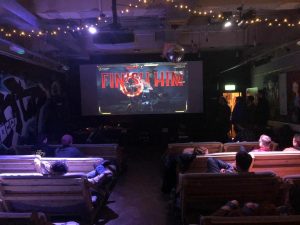 Despite all this, the event was not completely unsuccessful. We had a turnout of around 15 people, who seemed to really enjoy their time and expressed interest in returning to the next one. This allowed us also to run the tournament smoothly, without having to substitute any plans due to low numbers. Once again, I felt as though my managing skills were improving, as I was a lot more confident in the plans and layout this time around. As previously stated, though my communication skills were already fairly good, this once again did help, as I was letting people know about future plans for the event and more.
Despite all this, the event was not completely unsuccessful. We had a turnout of around 15 people, who seemed to really enjoy their time and expressed interest in returning to the next one. This allowed us also to run the tournament smoothly, without having to substitute any plans due to low numbers. Once again, I felt as though my managing skills were improving, as I was a lot more confident in the plans and layout this time around. As previously stated, though my communication skills were already fairly good, this once again did help, as I was letting people know about future plans for the event and more.
After the event concluded, Johan and I decided to brainstorm quickly on how we could increase its popularity, and also took onboard some feedback from those we attended. What we concluded was that for the next event, we’d create some sort of poll in which attendees could vote for what games and specific activities they want to see, therefore ensuring that they would definitely be interested. Obviously, as was the case with this particular event, sometimes other factors such as weather and illness can have serious effects, but we decided that if we tried our best to control all other factors, then things should run even more smoothly for the next time.
As I said earlier, this unfortunately turned out to be the last time I would be working at Cinema & Co. due to current circumstances. As of right now, there has yet to be a follow up event (due to not enough time passing too) so I can’t comment on if the next event proved to be more popular. However, I have no doubt that it will continue to improve, and I can’t wait to see what happens next!
Overall, my time at Cinema & Co. has been a rewarding experience, and I feel as though I’ve certainly learnt new things and improved on skills I’d picked up previously. Seeing how an independent cinema is run and maintained was very intriguing, and how they decide on what to show and when was especially interesting. However, the most rewarding element was improving my editing and managing skills.
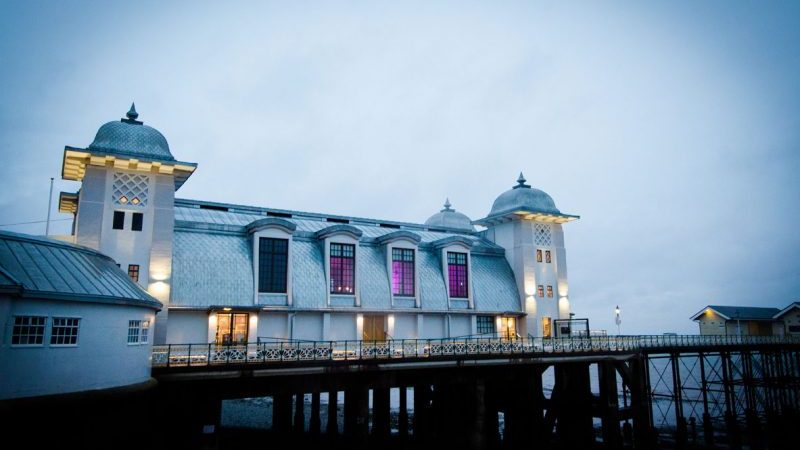
Snowcat Cinema: A Placement on the Pier by Chloe
South Wales’ Penarth Pier offers home not only to a cone of chips and a seaside view, but also to the world 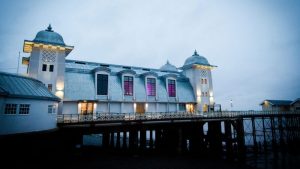 of Snowcat Cinema, where I’ve spent the past six weeks of my BA Film Studies exhibition-based placement.
of Snowcat Cinema, where I’ve spent the past six weeks of my BA Film Studies exhibition-based placement.
Snowcat, run by one-man-band Ben, is an independent cinema tucked away on the upper floor of the Pier Pavilion. Screenings run in the evenings from Thursday to Sunday, and include every kind of film: from the occasional blockbuster to, more often, the abstract and whimsical or the classic.
The nature of the cinema, independently developed and run, has allowed me a close insight into each of the behind-the-scenes processes of exhibition: the planning, programming and scheduling which all takes place before the screening of any film. I was one of four students spending time at Snowcat, and the varied interests of each member of our group made for a holistic exploration of the different elements which go into running a cinema.
In one of our first experiences, we were shown the ropes of preparing a ‘playlist’ for a screening. First, transferring the film from its DCP (Digital Cinema Package) into a playable format, and then scheduling the adverts, logos, and ‘no phone’ signals which will precede it. These technical skills in particular were something I had never considered when thinking about exhibition: naturally, I had expected to spend some time in a projection room, but I had never considered the amount of work which takes place before the film is even shown.
Such skills are extensive, and require a developed knowledge of the softwares involved in order to work. The planning which goes into ensuring the correct aspect ratio, the order of adverts, and even the timing of gaps between images, is such an incredibly key part of the film-watching experience which many audience members remain unaware of.
The real beauty of working a placement in somewhere like Snowcat, however, is the diversity of tasks I’ve been able to get involved in and, as such, the range of skills which I’ve been able to develop.
Again (and this is so important to the cinema and to my experience), the cinema is independently run – picked up and put together by Ben alone – and therefore doesn’t have the luxury of a team that can collaborate to put together screenings. All work is done by Ben, which means full involvement in every step of the process when arranging events.
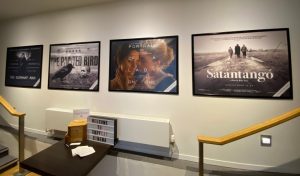
Of course, though, the group nature of this placement – expanding Ben’s team from one to five – meant that a level of communication was necessary to get things done. With every step of putting together a screening came emails with Ben, messages among us students, and updates via the shared DropBox file on which we came to rely for sharing data. The process was inherently collaborative, forcing me to refine and adapt my communicative skills to a group setting that I’d had little experience with previously.
The later weeks of this placement involved looking further into the marketing, ticket-selling, and public engagement aspects of working within the cinema. First, a run-down on the cinema’s audiences – those that Ben is targeting with his choices of film – and the ways in which he engages with them to encourage their attendance at screenings. Whilst the cinema’s primary audience is the older population of Penarth, usually retirees who come week-on-week to reminisce on films seen in their earlier years, the cinema is currently in the process of expanding and diversifying its audience to include the younger communities of Cardiff.
A large part of Snowcat’s engagement, therefore, takes place via social media: events are created on Facebook, and Twitter is used to announce upcoming films and interact with other local film communities, cinephiles and organisations such as Cardiff’s Chapter Arts. Here, the cinema has the opportunity not only to engage with existing filmgoers, but to reach those who are likely unaware that Snowcat even exists.
Distinct to the world of independent cinema, though, is the personal touch which comes with this online engagement. Besides a focus on upcoming films and events, Ben often tweets images relating to life in Penarth – a rainbow over the pier or his own dogs on a walk – to engage with the local audiences attending the cinema as a way of supporting their community.
Clearly, the concept of community is central to the running of Snowcat: with an audience consisting largely of returning viewers, it’s no secret that the Penarth locals are at the heart of everything the cinema does.
The screen itself has a screening suggestion box outside, and many audience members stay behind after each showing to take part in discussion around the films they’ve just watched.
When it does come to promoting films, though, Snowcat collects a list of specific information and images which can be used to market individual screenings. First, the film’s basic details – the director, release date, running time, colour, language and rating – and then a brief description of the film’s narrative with details of its popular actors or any awards it may have won.
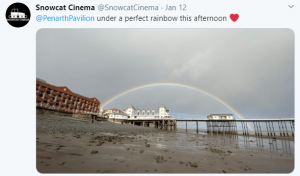
Images of various shapes (a ‘quad’, ‘portrait’, and ‘banner’ photo) are also collected to be used in various locations, from social media promotions to the TicketSource pages where seats will be sold. Here, we were given the opportunity to work independently in gathering the promotional materials for specific films. With some help from Ben, I collected materials for the Jojo Rabbit (2019) screening and then, alone, for the epic seven-hour Sátántangó (1994) showing.
The next step, and the one which took place in my final session at Snowcat, was a scheduling task. Independently, we were tasked with searching for events and anniversaries taking place across the remainder of the year from which a weekend of relevant screenings could be put together.
This is, so far, possibly the task I’ve found most intriguing: it’s rare that I, as an audience member, ever see or have the opportunity to understand the processes by which cinemas select and plan the films that they’re going to show. Snowcat’s independent management, furthermore, makes for a high degree of freedom over the screenings that can take place: so long as Ben can get permission, the film can be shown.
Pride Cymru, taking place from the 28th-30th August, provides opportunities for a weekend of LGBTQ+ themed cinema. On December 3rd, Jean-Luc Godard will celebrate his 90th birthday. Hitchcock’s Psycho turns 60 years old in September, and Jaws will be 45 in June.
It quickly becomes clear how central research skills are to the exhibition industry, particularly in the case of independently-run organisations. And, beyond that, the need for critical thinking skills when picking what can be shown to a cinema’s specific audience. Do Penarth’s pensioner’s want to watch Get Out for black history month? Possibly not. But The Color Purple, or 12 Years a Slave? Much more likely.
This part of the placement – the chance to develop skills around researching and putting together events appropriate for a particular audience – is one I feel I particularly engaged with. The opportunity to start from scratch, researching and developing potential ideas and events, is an experience I hadn’t expected to have on my placement but one which I definitely found exciting.
In putting together anniversary or celebration-based weekends of screenings, it becomes possible to create a wholly unique film experience, far different to the realm of multiplex chain cinemas.
Whilst Snowcat has now, unfortunately, had to close in the wake of the UK lockdown, we had initially made plans to work on a ‘pop-up’ cinema in the Summer. Working out the logistics of an inflatable screen at the end of the pier and what would overall be a less conventional cinema experience is something which I had particularly been looking forward to, and which I hope will still take place in the future.
For the same reasons, the cinema also had to cancel its Portrait of a Lady on Fire (2019) on the 28th March – a screening that I had been planning to come along to in order to engage more directly with the cinema’s community and with a more front-of-house role and the customer service skills involved in this.
So far, though, Snowcat has provided me with the chance to explore almost every step in the independent exhibition process, from brainstorming an outline of vague ideas for the year’s screenings to marketing an event and creating the film playlist which audiences will eventually see. Going forward, I’m eager to get back in contact with Snowcat and Ben when possible to help reach new audiences and further broaden my understanding of the exhibition process.
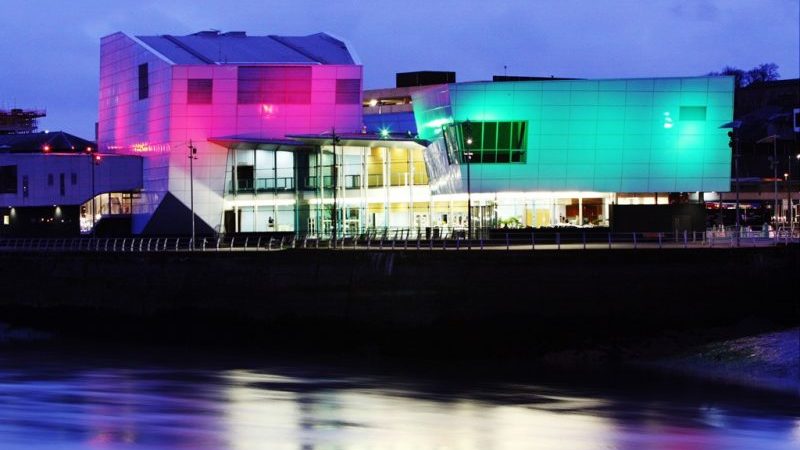
A Day in the Life at Riverfront by Malu
My placement at Riverfront started on the first week of February. As excited as I was from what I knew about the venue and their initiative, I also did not know what to expect. The exhibition environment was something completely new to me, having only worked in distribution and production before. I was looking forward to understanding how and why films are classified and programming works but was also slightly intimidated by Riverfront. A well-established arts centre at the heart of Newport known for the grand scale of its events and of its venue itself seemed like too much of a challenge for someone with academic ambitions to start off in the exhibition sector. But to my delight, it turned out to be a great experience.
Not having a specific role allowed me to work on a variety of things but my only ‘permanent’ task was ushering. A relatively simple duty that involves mainly checking tickets and showing people to their seats when necessary, ushering is not only an opportunity to watch great films but also a way to get know the kind of audience that Riverfront attracts firsthand. It’s also an amazing job if you’re into people watching – you get to see the full range of human emotions. I’ve seen a couple of the films I was ushering for before, so being able to rewatch them and pay more attention to the audiences’ reactions is an amazing reminder of the emotional power films have on us. Another perk of ushering is getting to interact with the audience and indulge in conversation afterwards, hearing their fresh thoughts on the film. Since all cinemas have a unique audience profile, getting their feedback and opinions on the films is key to creating a buzz and ensuring the high-quality experience they are looking for.
Getting to know the customers is also crucial when diversifying and developing audiences through experimental cinema and alternative content, something that Riverfront is proud to do through screenings of foreign language, independent and arthouse films.
Besides ushering for the screenings of So Long, My Son (2019), Cats (2019) and 1917 (2019), I also worked on the baby-friendly screenings – For Crying Out Loud – of Little Women (2019) and Jojo Rabbit (2019). While the suspicious looks I got for not having a baby with me were probably the most amusing part of that experience, it was still an interesting environment to be in. It’s a completely different kind of event, where the films work only as an excuse for parents to go out and have a day off. For those screenings, there’s a soft level of lighting in the cinema, the volume is lower and there’s soft matting for the babies, even if one of them mistook Taika Waititi’s Hitler for the real man and tried to crawl out of the cinema in fear. At the baby-friendly screenings, I quickly realised that the film is not the focal event and so the main job when ushering for those is catering to the special needs of the audience. That means providing care and support from arrival to departure, as well as maintaining good audience experience through screen alignment, correct sound and light levels appropriate to keep the babies comfortable without sacrificing the parents’ cinematic experience.

I worked closely with Andrew who, as the box office manager, is responsible for booking screenings. Riverfront only screens films six weeks after their original release as their licence is considerably cheaper, so much of our time when researching films to book was spent making sure that six weeks have passed before the date of its proposed screening. As Riverfront only has one cinema screen that is also used for other purposes, the rest of the process was one long and arduous task of booking the room, contacting the distributors of the film and agreeing on a split of profits, and notifying the financial department to authorise the transaction. Once that was done, we’d finally update the website with the confirmed dates/times, synopsis and photos of the film. Booking was probably my favourite job to do, as it gave me the opportunity to learn more about and engage with distributors, suppliers and the financial department, allowing me to handle and resolve issues through nothing but effective communication skills.
Despite the considerable amount of time and work it takes the book the films, Andrew and I managed to get quite a lot done, having updated the cinema programme until the end of April. Some of the films we booked were Parasite (2019), Oklahoma! (1955), Portrait of a Lady on Fire (2019), The Lighthouse (2019), Harriet (2019), Mr. Jones (2019), A Beautiful Day in the Neighbourhood (2019), Sonic the Hedgehog (2019), The Call of the Wild (2020) and Onward (2020). The most challenging part of booking for me was updating the website. I have to admit I was quite uncomfortable with the idea of doing that at first as I’m not the most tech-savvy person – ask anyone who knows me and they will tell you how many times a day I struggle with my phone. And even though it took me a while to get the hang of managing the website, I’m still glad I did. It taught me to be more patient and attentive since it’s all about double-checking your work – one small mistake can undo a lot of progress. I learnt that the hard way and I can assure you I’ll always triple-check everything from now.
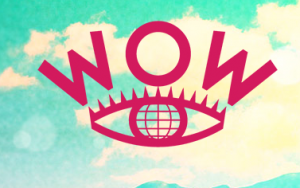 The biggest project I was involved in during my time at Riverfront was the Wales One World (WOW) Film Festival. The festival started in 2001 and has been taking place every year since, having as its main aim celebrating the riches of world cinema by bringing a selection of films from all over the world to cinemas across Wales. As WOW’s programme includes several different films that are screened in several different venues on different dates, we were very fortunate to have been able to host it from March 7th to 11th at Riverfront before the festival was eventually suspended due to the coronavirus. The festival was launched on Saturday with Made in Bangladesh (2019), a story of female empowerment in a textile factory in Dhaka. The screening was part of Riverfront’s celebration of International Women’s Day, alongside with several other events such as workshops, performances a
The biggest project I was involved in during my time at Riverfront was the Wales One World (WOW) Film Festival. The festival started in 2001 and has been taking place every year since, having as its main aim celebrating the riches of world cinema by bringing a selection of films from all over the world to cinemas across Wales. As WOW’s programme includes several different films that are screened in several different venues on different dates, we were very fortunate to have been able to host it from March 7th to 11th at Riverfront before the festival was eventually suspended due to the coronavirus. The festival was launched on Saturday with Made in Bangladesh (2019), a story of female empowerment in a textile factory in Dhaka. The screening was part of Riverfront’s celebration of International Women’s Day, alongside with several other events such as workshops, performances a
nd activities that marked the occasion. And although I couldn’t personally be there, I was told that the screening, as well as the entire event, was a success.
The festival continued with screenings of five other films – Arab Blues (2019) from France, Talking About Trees (2019) from Sudan, Running to the Sky (2019) from Kyrgyzstan, Sister (2019) from Bulgaria and Le Grand Voyage (2004) from Morocco. I could only attend and usher the screening of Le Grand Voyage which, unknown to me at the time, would mark my last day at Riverfront, so it’s a day – and film – I remember fondly. Thanks to my involvement with USW’s Film Reviewers Society, I also got a couple of members to come watch some of the films. I saw it as a great opportunity not only to get the society to work together but to also spark debate about the festival and the kind of films it aims to show. The plan was to write about them at our next meeting, which would spread the word about the festival and get our group up and running but those plans never materialised. It was still interesting to hear what my peers thought of the films and of Riverfront as a whole, especially since we’re the kind of audience their programme aims to attract.
Having been mainly working with and for Andrew, it was interesting to get involved in different projects with the rest of the team in my last few weeks at Riverfront. I worked a lot with Sally, the community arts development officer, who was also deeply involved in organising the WOW Festival. We discussed a lot about Riverfront’s website and social media platforms, and about finding a way to get audiences to share and post their opinions and reviews on the films. With that in mind, we’ve made plans to set up a Cinema Critics Club for support groups of recovering patients. The initiative was going to be a partnership with local support groups but unfortunately my placement was terminated before we had a chance to go ahead with that.
Nonetheless, the research I did into other local cinema clubs with a similar initiative was incredibly eye-opening. Even though I’ve been a film lover my entire life, I’ve never really considered the therapeutic – and even healing – aspect of films.
The most interesting project I’ve looked into is the concept of Cinema Therapy, which relies on using the cinematic aspects of film as a way to reflect on our own lives and experiences. Following the basis of many support groups in which sharing and discussion are the key aspects of its effectiveness, Cinema Therapy uses a set of questions to make its members reflect on how the film affects them personally and, therefore, encouraging emotional release and, hopefully, growth.
My last task at my placement involved working with Danielle, who’s the education and participation officer. She had plans to set up an educational initiative using film as a tool to bring communities together. However, much like the Cinema Critics Club project, we didn’t go ahead with it due to the coronavirus situation and the consequent termination of my placement. I still managed to do some research into local initiatives using film as an educational tool around UK and the results were fascinating. From getting students to produce animation storyboards in literacy lessons or using films to introduce a lesson topic, the advantages of implementing film as an instructional medium are endless. Doing that research helped me realise the cognitive benefits of film editing and how the post-production process explores the rhetorical and logical functioning of the human mind.
Having grown up watching films and having them deeply affect my character and personality throughout my formative years, it was moving to read about children and young people who are being encouraged to grow up with the same passion for cinema thanks to initiatives like the one Danielle wanted to set up.
Looking back on it, doing my placement at Riverfront was a very rewarding experience, and even though I’m upset that it had to be cut short due to unavoidable circumstances, I like to think that I’ve made the most of my time there and learnt a lot about the exhibition sector. It was even more rewarding having earned such level of trust and responsibility after a considerably short period of time with the staff. I could feel myself growing by really throwing myself into every task I could get my hands on. I felt genuinely valued as part of the team, and not just someone given a few trivial tasks to keep them busy. The entire team was incredibly welcoming and nice, giving me the freedom to express my ideas and suggestions without putting too much pressure on me. As for the social side of it, they never failed to indulge me in small talk, sweet treats and tea breaks, even after I confessed being a coffee person because, in the words of Frank Sinatra, “way down among Brazilians coffee beans grow by the billions”. The big tea versus coffee debate aside, I miss the staff dearly, especially since I didn’t get a chance to properly say goodbye and express my gratitude to them.
When my placement was eventually terminated, I emailed the team to thank them for everything they have done for me and I was overwhelmed with their response. Amid several of the sweetest ‘good luck’ and ‘wish you all the best’ emails, I was asked if I could write weekly reviews for Riverfront’s website and Facebook page. As it’s right up my alley, I couldn’t turn that opportunity down – as a self-proclaimed writer, it’s always a pleasure to have my work read by as a varied audience as possible. We’re still in the process of organising that as well as setting up a column for audiences to share their own reviews. Besides informally continuing our working relationship, we’ve also been frequently exchanging film recommendations, which led us to discover a shared love for Charade (1963) – we all agreed that no one can make lockdown more entertaining than Cary Grant and Audrey Hepburn.
All in all, I’m thankful for the placement I’ve been given, for the lessons it has taught me and, most importantly, for the people I’ve met through it – they’re as good human beings as they’re good professionals, and I wish them nothing but all the best. Finishing this journey with a better understanding of the various aspects of cinema exhibition and being able to move from one section of the business to the other, I’m happy to report that my enthusiasm and love for film has only increased upon learning the secrets of this part of the industry.
My biggest takeaway from my time at Riverfront has been the realisation of how important cinema exhibition actually is. In the age of streaming services where it’s easy to just watch the latest release on your phone, working at a venue where every team member puts so much effort into creating a social experience out of a film has sparked in me a desire to promote the power and value of the cinema-going experience.
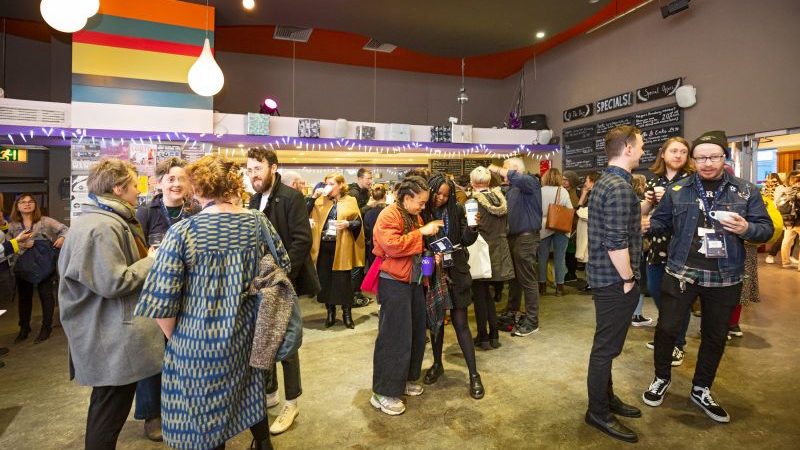
Carys Haf Evans: This Way Up 2019 Blog
Here I am from a small town in Wales walking through the streets of Nottingham to discover a lovely venue Broadway Cinema for the This Way Up 2019 conference. Entering the venue I take a seat and notice that I’m sat next to a lady who is also from Wales – I felt at home straight away, cup of tea in hand and excited for the next two days of sessions.
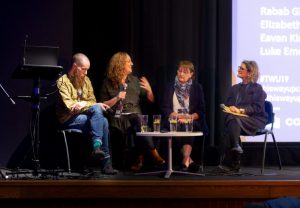 I always find it hard to decide what to go and see when it comes to an event like this as I just want to see and discover everything. I decided to try and go to talks that would be beneficial for Yr Egin and that could help us as a venue to develop and also for me as an employee to gain knowledge and confidence when it comes to my work as I’m fairly new to the role as Customer Experience Assistant (Marketing) and Yr Egin has only been open for just over a year.
I always find it hard to decide what to go and see when it comes to an event like this as I just want to see and discover everything. I decided to try and go to talks that would be beneficial for Yr Egin and that could help us as a venue to develop and also for me as an employee to gain knowledge and confidence when it comes to my work as I’m fairly new to the role as Customer Experience Assistant (Marketing) and Yr Egin has only been open for just over a year.
I enjoyed hearing views, opinions and tips from individuals from other venues during the sessions as a lot of us can relate to the same topics such as for example programming and also how to capture, develop and engage audiences which is something I would like to broaden my understanding further as part of my role with assisting with marketing.
Over the two days it was brilliant to hear so many inspirational speakers talk about their work and to guide us forward. I was fortunate to learn a lot about understanding how to capture wider audiences and to build relationships with other venues and platforms.
I think it’s so important that we introduce so many people to film. I thoroughly enjoyed listening to Yasmin Begum’s session on intersectionality – she was so passionate and enthusiastic sharing her ideas on how to make us more inclusive and telling us that price shouldn’t be a barrier for entry and that we should think outside the box when it came to engagement.
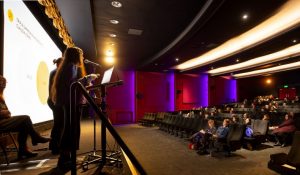
The session about More Than a Cinema related to our venue a lot as Yr Egin as the session title states is more than just a cinema – we also work with the community. It was great listening to how others work with a wider community offering them a space to be creative and collaborative and everyone sharing ideas thinking outside the box.
I think the Show and Share session was brilliant as it was great to see what different festivals and projects individuals and groups are working on across the UK giving us a taster on what they do.
I have benefited a lot from attending This Way Up 2019 and look forward to sharing and putting these ideas into practice back at Yr Egin.

Yasmin Begum: Sea Change Blog, 2019
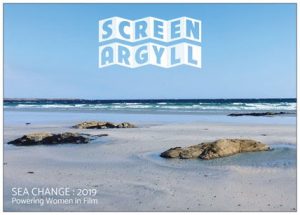 Women in Film development lab is organised by Screen Argyll, and located on the picturesque remote Inner Hebridean island of Tiree in Scotland. This year, the theme of the lab was “Finding Your Voice, Making Yourself Heard and Engaging New Audiences” around bringing change for women in film. I had the pleasure of attending in a capacity as a volunteer worker for Cinema Golau, meaning “Cinema of Light” in Welsh.
Women in Film development lab is organised by Screen Argyll, and located on the picturesque remote Inner Hebridean island of Tiree in Scotland. This year, the theme of the lab was “Finding Your Voice, Making Yourself Heard and Engaging New Audiences” around bringing change for women in film. I had the pleasure of attending in a capacity as a volunteer worker for Cinema Golau, meaning “Cinema of Light” in Welsh.
This lab brought together grassroots film practitioners, programmers and organisations for an absolutely enchanting series of days. There were sessions on engagement and meaningful inclusion, punctuated by long walks on white-sand beaches and around beautiful lochs.
Sessions offered at the lab were wide ranging and broad on things such as engagement, equality and diversity with a focus on increasing capacity of women working in film. For so long, it has felt as if we have “swam against the tide”: against the tide of predominantly white funder as BAME organisations, as BAME communities resisting exploitation, as women in a male dominated industry, as working class people in an industry predicated on the “middle class”.
For the first time in so long, it was a breath of a sweet breeze to be in a room full of like-minded people who are all thinking and feeling the same things about film and the organic audience development.
As a Welsh practitioner, it was especially good to be in Scotland owing to our shared similarities in some instances- of the devolved landscape in Wales and Scotland compared to England. I learned a tremendous amount about the similarities between Wales and Scotland around programming, devolution and funding.
A number of different speakers were present, including Toki Allison of Inclusive Cinema talking about engagement, and I particularly enjoyed hearing from Holly Tarquini of F-Rated and Rachel Hayward. This event and these discussions and sessions have enabled me to broaden my capacity and my knowledge base around areas relating to inclusivity and film.
I am extremely grateful for the opportunity to apply, attend and receive financial support from Film Hub Wales. There are more similarities between us and difference audiences and cinemas than we may think. I will be implementing the knowledge I have learned and the skills I have gained to make film and audience access and development more accessible for everybody- regardless of background- and I would not have been able to do this without the Women in Film development lab. More broadly speaking, it allowed me to consolidate my knowledge in a nurturing atmosphere and environment and allowed me to learn about broadening my capacity to best serve the communities around me.
Continuing personal development doesn’t always have to be imbued with the same 10-4 events, stagnant, stale and lacking lustre followed by reams and reams of paperwork. The Tiree lab was a life changing experience to be in a room full of passionate people all with the same aim: positive change for the industry regardless of your class, your race for a better and more accessible industry for everybody.

Into Film Young Reviewer, Cai, Reviews Showdown
Into Film Young Reviewer, Cai attends the premiere of Showdown at Cinema & Co., Swansea and lets us know his thoughts.
Cai says – ‘Showdown tells the story of Sam, a young autistic boy, with a passion for Western films, who must decide whether to stand down or stay his ground when a showdown presents itself. To demonstrate the main character’s autism, the sound is used perfectly and practically to signal when Sam is experiencing sensory overload, with the shaky camera adding to this depiction of his autism. The camera is also used well by the filmmakers to emphasise Sam’s isolation through far away wide shots that distance him from the viewer. I was impressed by the way in which the film uses a handheld camera, adding to the film’s sense of realism. The film’s close-up shots aid in immersing the audience in the story of the film by giving us the best view of the subtleties of the actors’ performances.
The film’s focus on an autistic character is a refreshing perspective that is brought to life by the young actor, Charlie Lock. His performance is incredible, he captures an autistic character through no dialogue, relying only on facial expressions. Another performance that shines is Sam’s Dad, who captures the parental perspective on autism; ranging from frustration to acceptance. These performances enhance the sweet story, that appeals to both young and older audiences. Younger audiences can connect with Sam’s perspective, whilst older audiences will connect with Sam’s parents.
Showdown is set in the small Welsh town of Bedlinog, a setting which perfectly demonstrates the idyllic aspect of the Welsh countryside. I also love the emotionally raw aspect of the story, as the town is very close to the writer’s heart, having grown up there. Bedlinog also fits the film’s western colour palette and aids in enhancing the film’s western iconography.
One of my favourite aspects of the film was it’s ‘proud to be indie’ feel, it all felt very homegrown. My only critique of Showdown was the pace of the editing which really makes the film go by all too fast leaving me desiring more.’
To find out more about the film and how to book, click here.
Find out more about the Into Film Young Reporter Programme.
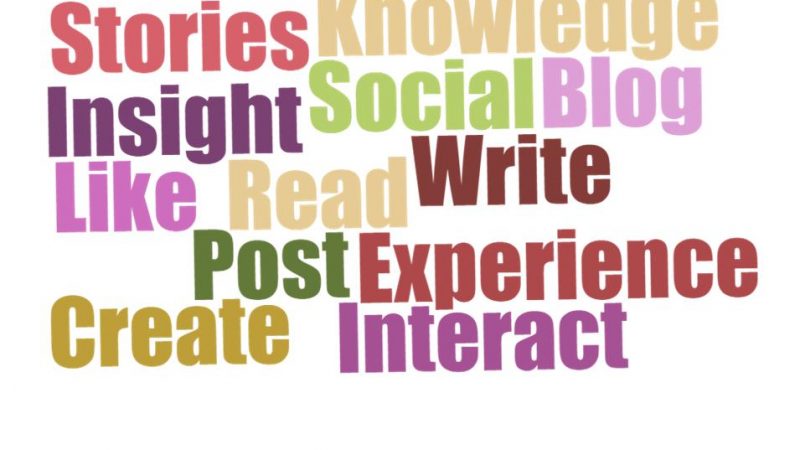
We want your Blogs!
Have you been to an event or taken part in a course that you think Hub members would be interested in? Send us your stories!
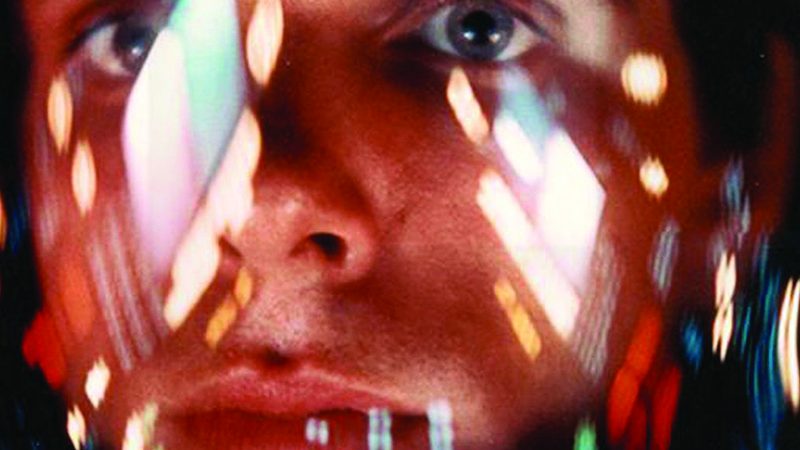
Young FAN Reviews Wanted (Amy Collins)
Amy Collins joined Chapter Arts Centre for work experience and wrote this review for us of 2001: A Space Odyssey 50th Anniversary Release
2001: A space Odyssey was an interesting film and very different to the usual sci-fi film. It is based around a strange object, which is found on the moon and because of this object a group of people have to go to Jupiter.
The film doesn’t have a soundtrack and uses famous classical songs instead. This puts emphasis on the long atmospheric scenes, which wouldn’t fit or make sense in other movies. Despite the atmospheric scenes I felt that some of them went on a little bit long, but it did make you think about why a certain scene was there.
The movie ends on a bit of a cliff hanger and I felt like I left the cinema trying to figure out what happened at the end. This separates this movie from movies with a predictable plot and ending and keeps the person watching A Space Odyssey in suspense.
Overall I enjoyed this movie and would definitely recommend it despite its sometimes intricate plot.
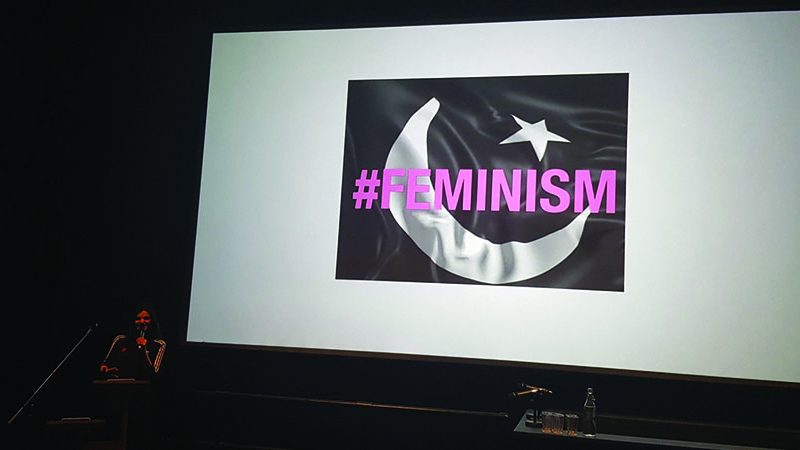
Inclusive Cinema Placement 2018 (Yasmin Begum)
FAN Access Coordinator Yasmin Begum discusses her time at Film Hub Wales working on the Inclusive Cinema project.
It’s an exciting time to be working in film exhibition and programming. Programming in the United Kingdom is becoming more and more varied and diverse, from more discussions on inclusion, engagement down to more community programming.
I’ve spent the past three months working on British Film Institute’s flagship Inclusive Cinema scheme. It’s an initiative to promote equality, inclusion and diversity in the film sector. I’ve been based in Chapter Arts Centre at Film Hub Wales in Cardiff, a creative hub of the city and the largest art venue of its kind in Europe.
My time and work has been really varied at Inclusive Cinema. I’ve attended training, learned loads about areas I didn’t know about before and had the opportunity to attend screening days. I’ve enjoyed learning more about access and inclusion while in-post. One thing I’ve noticed working in the sector is how in a tighter funding climate that identities are sometimes pitched against each other. I’m proud to say that Inclusive Cinema champions an intersectional attitude and approach to working that looks at where we can join up work in new areas to ensure that nobody is left behind. Intersectionality is a framework that looks at how power impacts different groups in society to see how that power overlaps for different groups. I’m thrilled I have been able to work on information pages and highlight our shared similarities to make film exhibition and programming a better place for everyone.
A definite highlight of my time has been the events that Inclusive Cinema and Film Hub Wales has helped to deliver. In December, I was fortunate enough to give a Pecha Kucha presentation on the importance of intersectional approaches to film programming for audience development at the fantastic This Way Up Conference in Liverpool. Intersectionality is a tool for understanding the world around us, looking at power and how some groups are less likely to have power than others – or be subject to power. The next month I was in Scotland with Film Hub Scotland delivering “Opening Our Doors”, a day aimed at increasing the capacity of programmers and cinemas who are members of FHS. I’d never had an opportunity to programme like that and my heart soared to overhear attendees talk about new ways in which that want to make their venue more accessible for people from lower income communities.
There’s a quote by Audre Lorde (a self-described “black, lesbian, warrior mother poet”) which reads;
“It is not our differences that divide us. It is our inability to recognise, accept and celebrate those differences”.
I’ve thought about this a tremendous amount when considering exhibition and programming in the UK. Who programmes what? And for whom? And who can afford it? These are the questions that go through my head. I feel for far too long that our inability to discuss topics relating to equality and inclusion has divided us and resulted in a myth of meritocracy.
The UK is small. The sector’s even smaller. It’s time to act to both set and promote good practice in the industry to not only support exhibitors, but equality and diversity in film overall at every level including filmmakers, screenwriters etc. I’d never really understood BFI, what it did, what its remit was or how it affected the communities I come from. Now I know and I’m excited to see BFI champion equality and diversity as it goes from strength to strength. Inclusive Cinema is a step towards recognising, accepting those differences to help support the sector and I look forward to seeing it thrive.
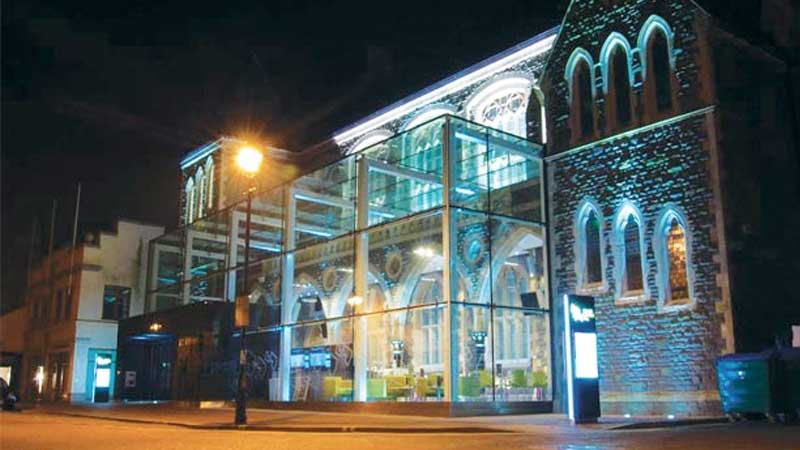
UKCA Annual Conference 2018 (Gwyn Hall)
Jamie Hughes from Gwyn Hall, Neath, attended the UKCA’s Annual Conference. This is what he thought:
“From this conference I realised how fast technology is moving, from ticketing apps to digital signage and poster cases, to the emergence of laser projection.
Technology is working hard to make cinema more inclusive and the closed caption technology has the ability to break down language barriers and give people more opportunity to use the welsh language.
If you are looking at upgrading your digital projectors it’s worth looking at laser projection as even though it’s a bit more expensive, there are no lamp costs, plus it can live in a small pod instead of needing well ventilated, sound proof booth.
Sometimes knowing what and when to programme films can be challenging but more and more analytics software can help ensure the correct decisions are made or at least reduce the risks”
We are already booking in meetings with service providers who can offer apps, data analytics and e-ticketing systems.
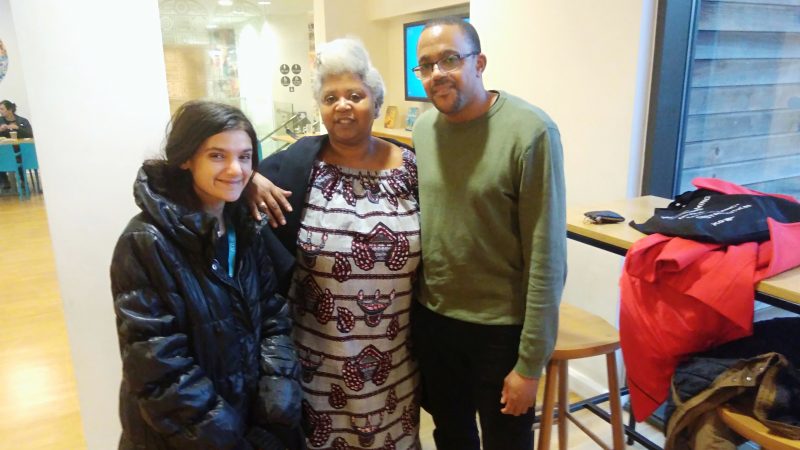
ICO I.D. Screening Day 2018 (Cinema Golau)
Yvonne Connike and Yasmin Begum from Cinema Golau attended the ICO’s I.D. Screening day, which focuses on diversity and inclusion. This is what they thought:
“This was an important event for my organisation’s development as we were able to talk about diversity, identity and programming in a safe space. We had a rare opportunity to connect with BAME programmers from other of all level and specialisms and from other parts of the UK, as well as meeting up with my peers in Wales.
It was great to get the opportunity to speak with Gina Duncan and learn about her journey and experiences of creating and what she describes as a nimble, responsive and socially engaging programme for The BAM Centre in Brooklyn New York. Gina was very good at identifying new talent to work with and working as a team. The knowledge that Gina found success curating socially engaging films and this was welcomed by BAME audiences was inspiring and encouraging.
Having worked in the industry for a very long time I am aware that it is very easy to find yourself feeling lonely and isolated in your work. BAME practitioners are often marginalised. I feel we do not have the opportunities to experiment and make mistakes which is one of the reason meetups like this are so important. In one our many conversation, the subject of making funding applications was discussed. It became clear there need of an ecosystem of mentoring for new applications to come through the system.”
I came back with a stronger commitment to nurture diverse, intersectional intergenerational audiences and to build their confidence to become future programmers and activists and continue to provide space for growth and change.
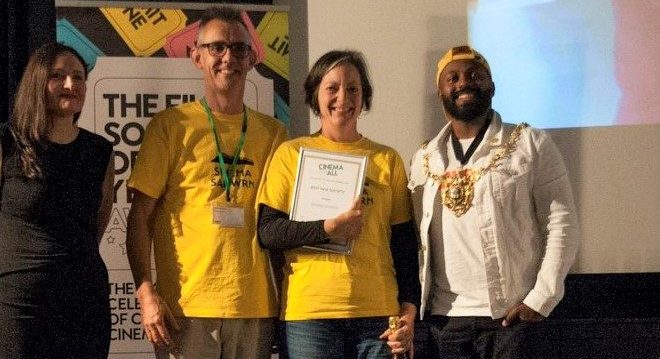
Cinema for All Conference 2018 (Sinema Sadwrn)
Lisa Denision from Sinema Sadwrn attended the 2018 Cinema for All Conference in Sheffield, where they won Best New Film Society. Here’s the story of their trip:
“The Cinema for All Annual Conference was a first for us, as a new film society. It was a great way to meet fellow cinema enthusiasts, gain new knowledge, celebrate all the hard work that community cinema volunteers do and most importantly it provided us with real encouragement and support which is essential for any fledgling group who are finding their feet.
Being immersed in all things cinema for a whole weekend gave us time to really reflect on what we’re doing, how we’re doing it and how we could learn and improve. We bought back lots of ideas, particularly in relation to programming, which was a word we kept hearing but one that we’d never even used ourselves. We are now going to work out how we might develop an annual programme rather than just thinking a couple of months ahead which will ensure that we not only cater better for our diverse audience but that we provide them with the ability to plan ahead and think about which films they want to attend throughout the year.
We were really inspired by the different approaches that other clubs take, some were all about providing less frequent but very special immersive experiences, others catered for niche audiences and some were simply passionate about providing a platform for independent film makers as an alternative to mainstream cinema. I think we are a little bit of all these, but our main driver is about providing a social opportunity in a dispersed rural community that doesn’t have easy access to many other services – maybe this is something they could cover in future events.
Fortunately, through social media, we can now stay in touch with some of the great film societies we connected with and keep an eye on the ideas and programming that they’re doing. We hadn’t really looked further afield until now so I think this will really benefit us when determining our own programme and events.”
Winning the award for Best new Film Society, more than anything, gave not just us, but our audience and the whole village an enormous boost. It’s not often we get a mention at a national level! We flew the flag for Wales and talked about our inclusion of welsh shorts to other societies who were also interested in showing shorts. Our confidence has really grown and we now feel like we will continue to grow and develop in a way in which we may not have envisaged before the event. We hope more members of the committee will be able to attend next year – it’s a lot of fun as well as a great learning experience.